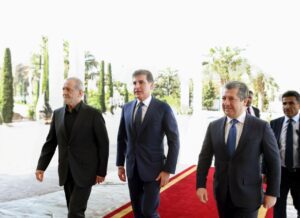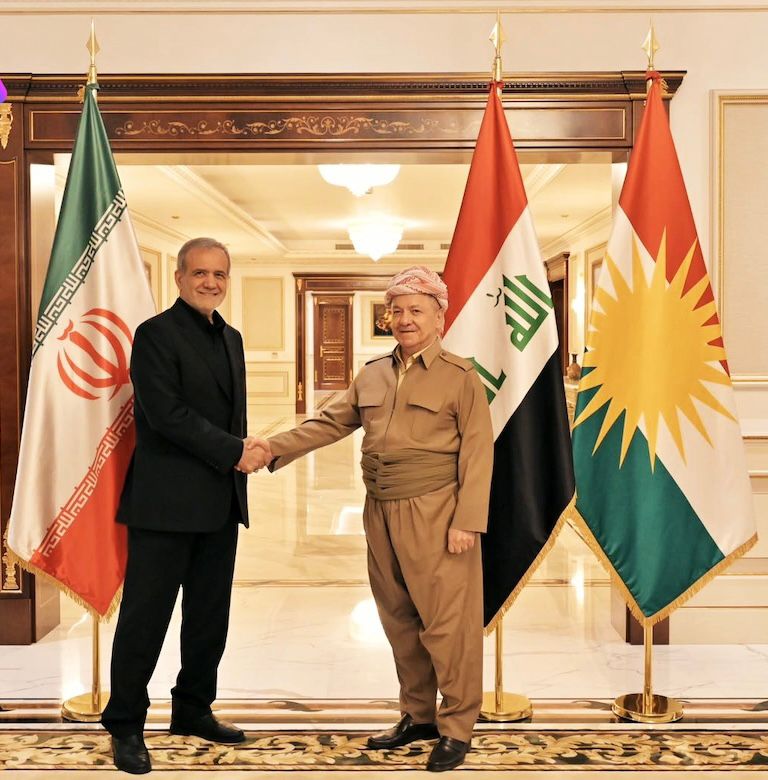A Diplomatic Milestone Reshapes Middle Eastern Politics
In a groundbreaking diplomatic move, Iranian President Masoud Pezeshkian has completed a historic visit to Iraq and the Kurdistan Region, marking the first time an Iranian head of state has set foot in Erbil. This landmark trip, Pezeshkian’s inaugural foreign visit since taking office, has sent shockwaves through the geopolitical landscape of the Middle East and may herald a new chapter in regional relations.
The decision to make Iraq his first international destination signals a clear shift in Iran’s foreign policy priorities. This strategic move underscores Tehran’s renewed focus on strengthening ties with its immediate neighbors, rather than courting global powers. Analysts interpret this as a pivot towards regional diplomacy and cooperation, potentially reshaping the dynamics of Middle Eastern politics.
During his visit, President Pezeshkian engaged in extensive discussions with Iraqi officials, covering a wide range of topics including political, economic, security, and cultural matters. These talks culminated in the signing of 14 memoranda of understanding, spanning diverse fields such as sports, archaeology, education, trade, and natural resources. However, these agreements have not been without controversy, as some observers question their long-term implications for regional power dynamics.
The most significant aspect of Pezeshkian’s tour was undoubtedly his visit to the Kurdistan Region, following two recent visits to Tehran by Kurdistan Region President Nechirvan Barzani. This suggests a thawing of previously frosty relations between Iran and Kurdistan, marking a potential turning point in their diplomatic ties.

Kurdistan Visit: A Charm Offensive and Security Assurances
In Kurdistan, President Pezeshkian launched a charm offensive, meeting with various political parties, community leaders, and religious groups. His decision to address the public in Kurdish was particularly well-received, winning over many local hearts and minds. The Iranian leader called for enhanced cooperation between Iran and Kurdistan across multiple sectors, emphasizing their deep-rooted historical and cultural connections.
Kurdish officials, including Kurdistan Region President, reciprocated the goodwill, describing the visit as historic. In a significant diplomatic gesture, they pledged not to allow Kurdish territory to be used for attacks against Iran. This commitment is likely aimed at addressing Tehran’s longstanding security concerns while paving the way for improved economic and political ties.
President of the Kurdistan Region expressed optimism about the future of Iran-Kurdistan relations, stating, “Indeed, there are some problems, but we will solve them collaboratively as a team. The Kurdistan Region is ready to strengthen its relations with the Islamic Republic of Iran across all sectors.”
Throughout his public addresses, Pezeshkian consistently emphasized the historical ties between Iran and the Region. He remarked, “It is a fact that Iran and this region have historically stood together through numerous events that have led to conflicts and tensions, often collaborating to address shared challenges. This perspective remains true today. In times of peace and stability, it is essential to leverage this historical partnership.”
Regional Cooperation and International Implications
The Iranian President’s visit has far-reaching implications for regional dynamics and international relations. By prioritizing engagement with neighboring countries, Iran appears to be recalibrating its foreign policy approach. This shift could potentially lead to a new era of regional cooperation, with Iran playing a more central role in Middle Eastern affairs.
Pezeshkian emphasized the importance of cultural, economic, political, and security cooperation as a foundation for enhanced relations between Iran and its neighbors. This multifaceted approach to diplomacy suggests a comprehensive strategy aimed at rebuilding trust and fostering mutually beneficial partnerships in the region.
As the dust settles on this historic visit, observers are left to ponder its long-term implications. Will it lead to a new era of regional cooperation and stability? Only time will tell, but one thing is certain: President Pezeshkian’s trip to Iraq and Kurdistan has marked a significant milestone in Middle Eastern diplomacy, potentially reshaping the region’s political landscape for years to come. The success of this diplomatic overture will depend on how effectively Iran and its neighbors can translate these goodwill gestures into tangible cooperation and mutual benefits in the coming months and years.
Jawad Qadir

